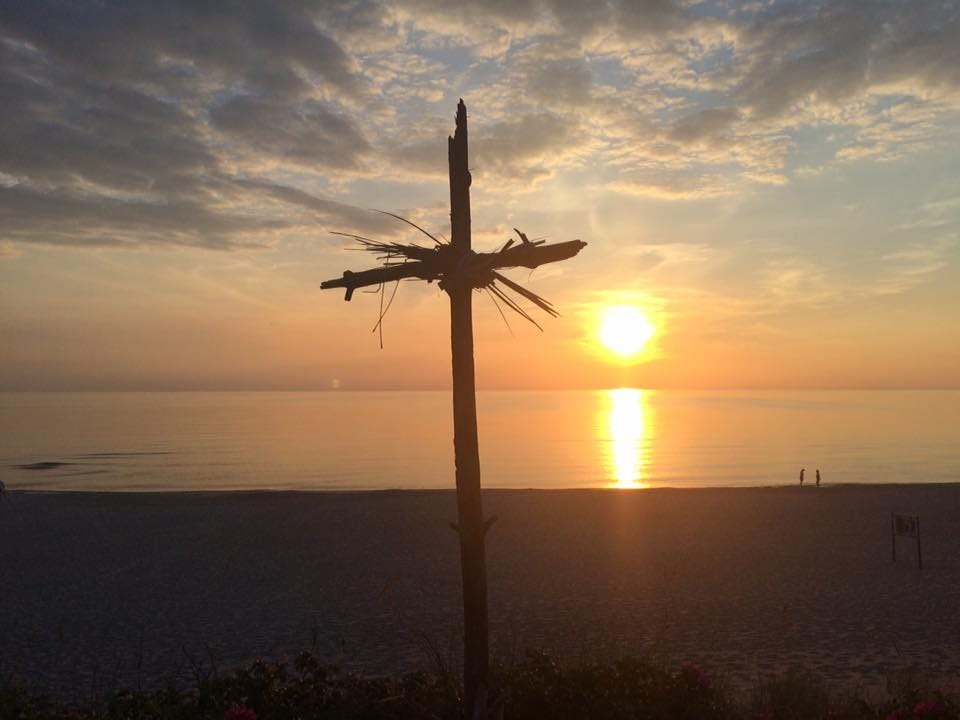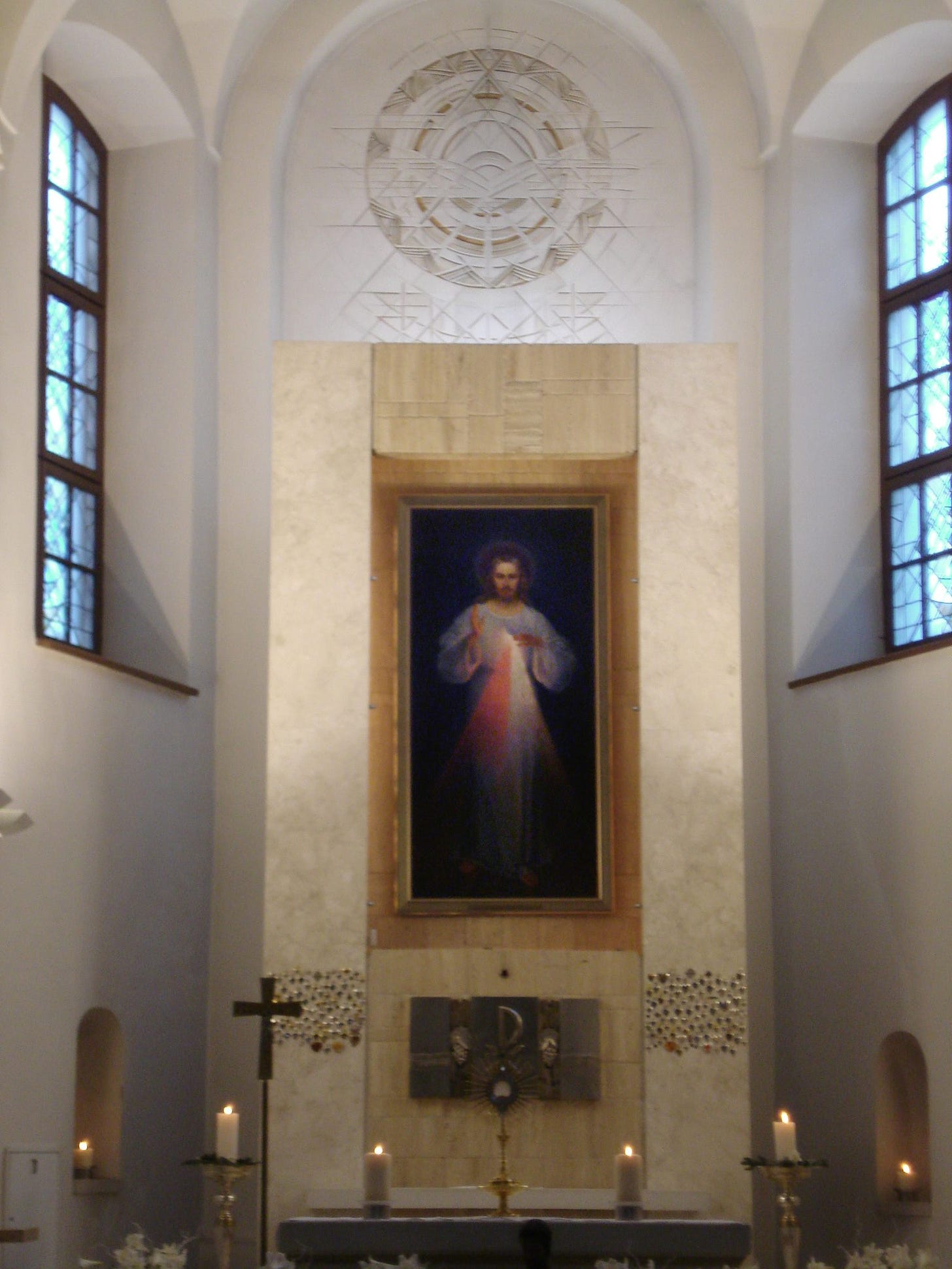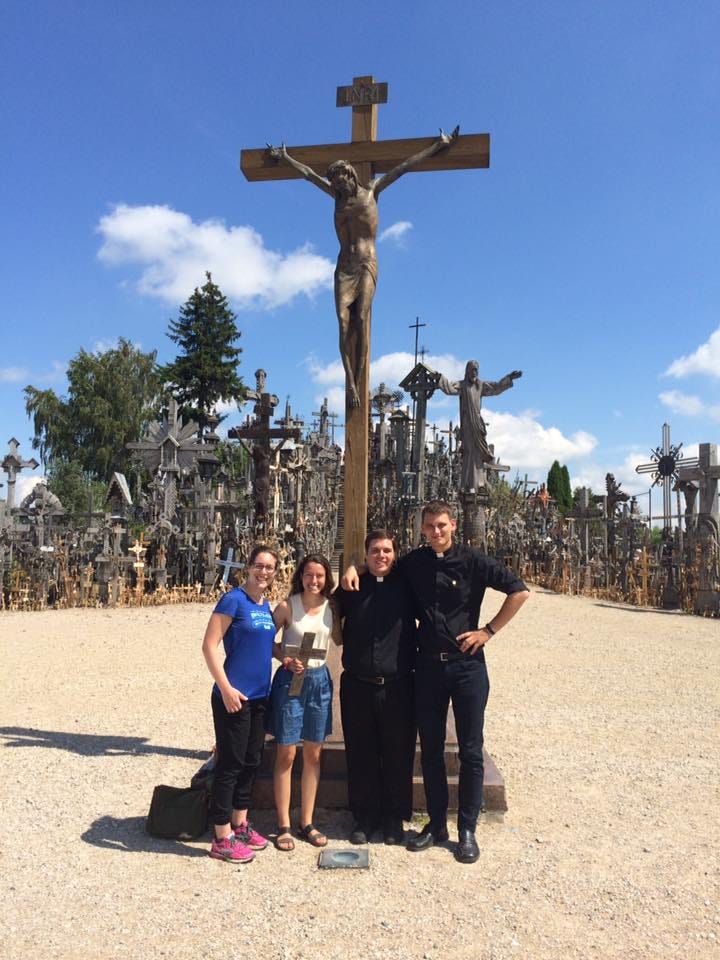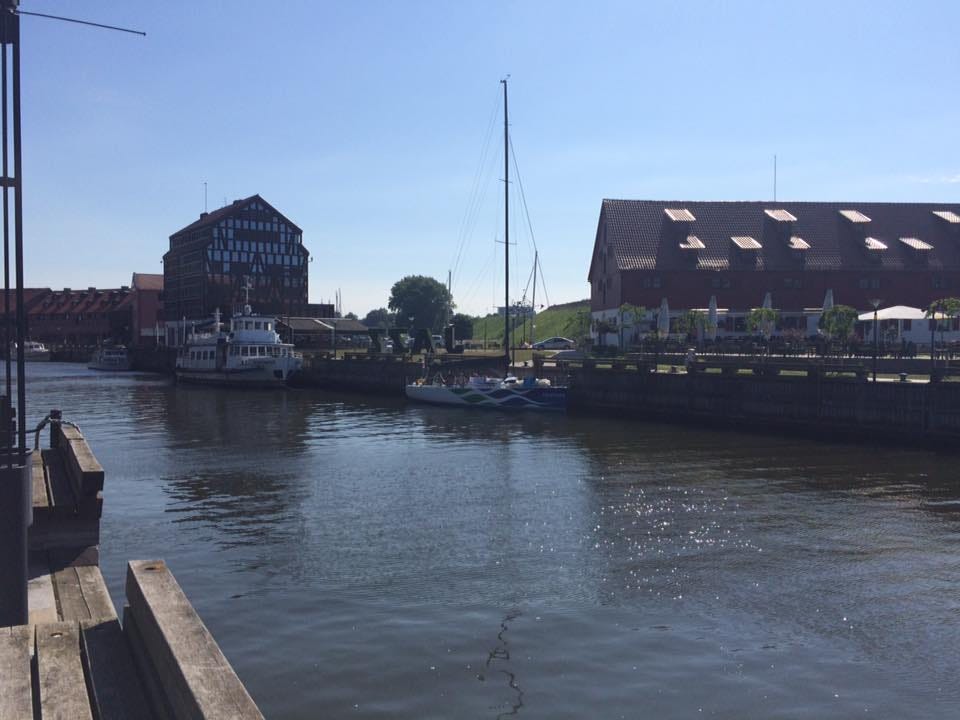I had absolutely zero expectation of any response when I blind fired an email into the chancery of the Archdiocese of Vilnius to ask about summer work opportunities. It was the spring of my first year of theology in Rome, and I had to come up with a plan for what I was going to do in the coming months instead of going home. I could have gone anywhere and done anything, as long as my plans didn’t include the United States of America or an active war zone. A solo mission to Bethlehem apparently pushed too closely on the latter for the seminary faculty, so I was told to reassess my options.
Since I had arrived in Italy the previous summer, Lithuania had been toward the top of my list of places to visit. My DNA is pretty much the great American melting pot – a little bit of this and a little bit of that – with the exception of my maternal grandmother’s family, who all came from Lithuania.
The story had always captivated me. Alberta, my great-grandmother, had been born in the United States but returned with her parents to Lithuania as a child. That made her a dual citizen; and when Europe began to rumble in the mid-1930s, that privilege opened a door. As a teenager, she left her entire family behind in Klaipėda and returned to the U.S. to begin a new life. She settled in Baltimore and met her love, Victor. They were married at the Lithuanian parish, Saint Alphonsus, at the corner of Saratoga Street and Park Avenue. So also were her daughter and her granddaughters, including my mother.
That side of the family has always held on to its heritage. We would attend the annual festival at Lithuanian Hall. We broke wafer bread and passed it around the table at Christmas. And not a birthday went by without someone intoning Ilgiausių metų (May you have a very long life) with Alberta (and, since her passing in 2005, one of us in her honor) shouting after the first verse: That’s enough!
Alberta never went back. She never saw again the family she had left behind, except for the one trip her brother was able to make after the Soviet withdrawal. My assignment to Rome was the opportunity to be the first of her lineage to return. I needed to find something to do for the summer months between first and second theology. I had no idea what anyone in Lithuania could do with a young seminarian who spoke English and a tiny bit of Italian. But it was worth the ask.
Within a day, a response from the chancery came. In fact, it came from the Archbishop himself. He expressed his interest and asked if we could get together on his upcoming trip to Rome. I met him outside the Porta Sant’Anna, and we walked to a café on the Borgo Pio. His English was impeccable. As I found out, that’s because he’s American. Gintaras Grušas isn’t anywhere close to Joe Smith on the index of popular American names. But he, like Alberta Salkaukas, was born in the United States to Lithuanian parents. I told him her story. There are a lot of stories like that, he replied with both deep empathy and a touch of personal pain. His own father and mother had been displaced from each other by the iron curtain for 16 years. Nixon negotiated with Kruschev to allow 200 separated families to be reunited. The Grušas’s were on the list. Gintaras was born the year after they reunited.
The work he proposed was with the archdiocesan pilgrim office. This was 2016, and Vilnius was expecting a large number of pilgrims to pass through on their way to Krakow for World Youth Day at the end of July. Archbishop Grušas told me how Vilnius has a larger claim on the Divine Mercy saga than most people realize. That was certainly news to me. Many of Faustina’s revelations took place in Vilnius, including those that directed her to have an image of her vision of Christ painted. That image – the only one she herself lived to see – hangs today in a small shrine in Old Town Vilnius. The Archbishop’s proposal was that I would guide English speaking pilgrims to it and to the other sites in the city associated with the saint.
I landed in Vilnius in late June and was greeted upon arrival by my supervisor, the director of the pilgrim office, Inesa. Saint Benedict instructed his monks long ago to greet visitors as if they were Christ. I had never known true Christian hospitality until Inesa and her husband, Vitas, extended theirs to me. I sometimes wonder if I have known it since. Within my first days in the country, they took me to a large outdoor festival celebrating the Nativity of Saint John the Baptist. As Inesa explained, it was a pagan solstice festival prior to Lithuania’s baptism in the 14th century that was transformed into a Christian feast. I cannot vouch for the motivations of all those hundreds, perhaps thousands, of Lithuanias that gathered that night in an idyllic field along a winding river. Some, perhaps most, were secular. But those with Inesa and Vitas were there because of Christ and the Church. Catholicism in Lithuania survived through Soviet oppression largely through an underground publication called Ateitis (the future) circulated among university students that gradually swelled into an ecclesial movement. My hosts and their friends – all young Catholics – belonged to that movement; and my encounter with them profoundly impacted my understanding of the Church. Practically all of my Catholic peers and friends were seminarians or priests. Ateitis was my first witness to the Church alive in and among young people.
At the end of my first week in Vilnius, Inesa told me that one of the seminarians would take my that weekend to visit the Baltic coast, including the town of Klaipėda, where my great-grandmother was from. To be entirely honest, I was annoyed. I had just arrived and was still getting settled. I simply did not want to go. But there was no guarantee I would have another opportunity. Begrudgingly, I agreed. I was to meet Gabrielius at the pilgrim office early, around 7:00am. We would drive first to Šiauliai, to see the famous Hill of Crosses, and then to the coast. Arriving around 6:50am, I opened the office door and heard Inesa around the corner ask: Where did you say you are from? Baltimore? I think that is where our seminarian is from. Inesa came out and found me. She said that two young women had just arrived on an overnight bus from Poland and who say they are from Baltimore. I’ll admit that I suspected something had gotten lost in translation and that she was mistaken. Most gratefully, I was wrong. Allie and Lauren came over and introduced themselves. It was all true. They adjusted their plans and came with me and Gabrielius to the Hill of Crosses and took a bus back to Vilnius as we continued on to Klaipėda.
Our encounter was the result of divine providence. Had any of us arrived later than we did, we would have missed each other entirely. Whatever funk the inconvenience of a gracious offer to make a cross-country trip had put me in was completely obliterated. The Lord wanted me to go. The sheer improbability of this encounter was enough to prove that. The Lord also wanted this trip to be a blessing. The hours of good and holy conversation between the four of us proved to be just the first installment.
Gabrielius and I arrived to Klaipėda in the late afternoon and took the ferry across to the peninsula where we caught an evening Mass and hiked the sand dunes to watch the sunset across the Baltic from beach. Gabrielius, nearly instinctively, found some pieces of driftwood and tied them together to form a cross and stuck it in the sand. I was a foreigner in another world, so far from home; but what stayed the same – and what alone stays the same amidst any and all change – was the cross. That small gesture brought me great peace.
The following morning, we visited the city of Klaipėda itself. However far I may have been from home, this seaport town felt enough like Annapolis to seem familiar. I recall distinctly standing on the edge of a major pier looking out at the water and the ships sailing by. Maybe Alberta (or ‘and-mommom as I called her) had stood there too. Maybe this was where she stepped aboard the ship that took her to freedom. Maybe this was where she said goodbye to her parents for the last time. There is no way to know. But as I imagined that moment then, as I do now, I can’t help but think of the Lord’s command and promise to Abraham: Go from your country and your kindred and your father’s house to the land that I will show you. And I will make of you a great nation, and I will bless you, and make your name great, so that you will be a blessing (Gen. 12:1-2). Alberta was a strong and brave woman. I do not hesitate to compare her with Abraham. She would have appreciated that, too.
My work at the pilgrim office took a number of forms: giving tours, ghostwriting for the chancery, cleaning up English translations for booklets, serving Mass, organizing pilgrim groups, etc. I enjoyed it all deeply. Even the daily (sometimes twice daily) Lithuanian homilies that routinely passed the 20-minute mark. I asked Inesa once if the priest’s homilies were profound. She said no, he just rambles. Call it some kind of evidence of the catholicity of the Church or not, but from then on it didn’t matter he was speaking Lithuanian. I still didn’t understand what he said. But I felt one with the people having to listen, for I too knew what it felt like to sit through a wandering homily.
The Archbishop had arranged for me to stay in a guest room in a small convent near the Cathedral. The top floor had four individual rooms like mine. Other guests came and went once in a while. On one particularly hot afternoon, I had my window open, and so did the occupant in the room around the corner from mine. I had not met or even seen the new guests who had just shown up, but as my neighbor answered a FaceTime call, I quickly learned that she, at least, was American. Hi! It’s good to see everybody! Oh, are you eating crabs?! There is only one place on earth where you can ask that question. Later that day, I found them – three religious sisters in all – in the shared kitchen and asked if any of them were from Maryland. Sister Constancy raised her hand. She was from southern Maryland and had been sent by her community to Lithuania to teach catechism in a small, rural village. She and her sisters were in Vilnius that summer to work on their Lithuanian. I was grateful for their companionship and witness to the Gospel.
I could share more stories about my summer in Lithuania, but I think from these I can make my point: God’s mercy is unexpected. I had no idea what I was asking for. I had no idea what I was being asked to do. I had no idea I would meet any of the people I did. I had no idea I would change how I did. And that is the point of the Christian life. My great-grandmother had no idea as she stood on Lithuanian soil for the last time what her new life would be. God does not show us the whole picture all at once. And that is perhaps among his greatest acts of mercy, for the whole picture would surely frighten us. Rather, he gives us a promise: life. And the promise of life compels us to leave our selfish forms of non-life behind to embrace the yet unknown life the Lord has set before us. Let us go forth in peace. In the name of Christ. Amen.
P.S. As a small group of friends finished dinner on New Year’s Eve in 2016, someone found me to say that a sister who knew me had come to the seminary to watch fireworks. It was Sister Constancy. She was able to take a holiday to visit her sisters in Rome. Far more recently, after celebrating Mass at the Cathedral, a young mother introduced herself to me as an occasional daily Mass go-er. Actually, she corrected, we’ve met before. It was Lauren. If the promise of life culminates in eternity, then I can only imagine that our entry into the communion of saints will be those kinds of reunions over and over again.









Thank you for sharing reflection of visit to Eastern Europe. The lives of religious are so beautifully rich, and it makes me sad to think of people (my close family members specifically) who can't or won't acknowledge how much of a difference faith can make in one's life.
Loved the Tolkien-ish essay title.
I very much appreciate your discussion series on Joseph Ratzinger.
Keep up the good work!
Beautiful story and privileged opportunity given to you, to experience your Lithuanian family ties, in addition to being a guide for the Church to the portrait of the Divine Mercy in Vilnius. I understand that it easily fits as an overlay to the Shroud in Turin. It is a miracle portrait of Our Lord Jesus, as the painter is said to have painted it by verbal guidance of St. Faustina. Imagine making a painting with verbal directions of another person, and it fitting as an overlay of the Shroud, if that is the case! Dora